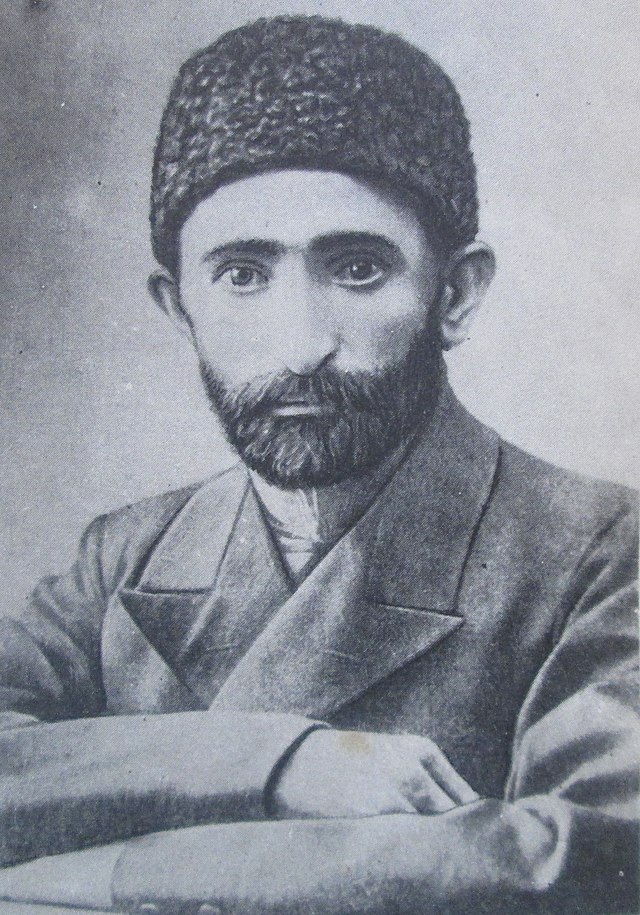Mirza Ali-Akbar Sabir: Difference between revisions - Wikipedia
 Article Images
Article Images
Content deleted Content added
HistoryofIran 95,130 edits |
HistoryofIran 95,130 edits |
||
| (8 intermediate revisions by the same user not shown) | |||
Line 1:
{{Infobox writer | name = Mirza Ali-Akbar Sabir Line 22 ⟶ 21: '''Mirza Ali-Akbar Tahirzada''' ({{lang-az|میرزا علی اکبر صابر}}: 30 May 1862 – 12 July 1911), commonly known by his [[pseudonym]] '''Sabir''' ({{lang|az|صابر}}), was a satirist and poet in the [[Russian Empire]], who played a leading role in development of [[Azerbaijani literature]]. He grew up in a religious, middle-class household that opposed modern education. During his adolescence, he became a pupil of the distinguished poet [[Seyid Azim Shirvani]], who established a modern institution where various subjects were taught. With Seyid Azim Shirvani's support, Sabir began translating Persian poetry and writing his own Azerbaijani poetry. Although his father initially wanted him to work in the family grocery store, he eventually accepted Sabir's literary ambitions after the latter's strong opposition, including a failed attempt to flee to [[Mashhad]]. In 1903, Sabir published his debut poem in the [[Tbilisi]] newspaper ''Sharq-e Rus'', and by 1909, he was writing for the satirical magazine ''[[Molla Nasraddin (magazine)|Molla Nasraddin]]''. His works covered a wide range of topics, including political satire and social commentary, often criticizing corrupt officials and religious hypocrisy. Sabir's innovative use of Azerbaijani set his poetry apart from traditional forms. He spent his last years in [[Baku]], where he died in 1911. == Biography == Sabir's birth name was Mirza Ali-Akbar Tahirzada. He was born on 30 May 1862 in the city of [[Shamakhi]],{{sfn|Javadi|2020}} then ruled by the [[Russian Empire]]. At the time, it was the largest city in the [[Shirvan]] region.{{sfn|Bosworth|2020}} Like the majority of Muslims in the [[South Caucasus]],{{sfn|Rezvani|2015|p=154}} Sabir's native tongue was [[Turkic languages|Turkic]]{{sfn|Hodgkin|2023|p=45}} and he was an adherent of [[Shia Islam]]. He grew up in a religious, middle-class household where they did not seem to want to give him a modern education. During the start of his adolescence, he became a pupil of the distinguished poet [[Seyid Azim Shirvani]], who had established a modern institution where [[Arabic]], [[Persian language|Persian]], [[Azerbaijani language|Azerbaijani Turkic]], [[Russian language|Russian]] and other topics were taught. Sabir started translating Persian poetry and writing Azerbaijani poetry with the support of Seyid Azim Shirvani.{{sfn|Javadi|2020}} Sabir's father wanted him to work in the family's [[grocery store]], thinking that a few years of education would be sufficient. However, he eventually allowed Sabir to continue his literary research, due to the latters strong opposition, including an attempt to flee to [[Mashhad]] by a caravan. In Shirvan's literary circles, Sabir made a lot of acquaintances and composed numerous ''[[ghazal]]s'' in the style of Persian poets, especially [[Nizami Ganjavi]]. In 1885, he travelled to several cities in [[Qajar Iran|Iran]] and [[Central Asia]], thus expanding his intellectual knowledge and later inspired to write about the locals there. Following his return home, he married and became the father of eight daughters and one son.{{sfn|Javadi|2020}} Line 31 ⟶ 30: Due to his large family, Sabir was forced to work a lot. He made soap for fifteen years, during which time he would joke "I make soap to wash away the external dirt of my countrymen." He attempted to establish a school in the European tradition, but failed. He also received numerous anonymous and hostile letters as a result of his criticism of the conversative factions. It was reportedly the journalist Hasem Beik Vezirov who sent him some of these letters. In the journal ''Sada'', Sabir replied to him: "I am a poet, the mirror of my age/ in me everyone sees his own face/ As it happened yesterday, ‘a person’ looked at me /Seeing none other than himself in the mirror." {{sfn|Javadi|2020}} [[Image:Sabir in Molla Nasreddin.jpg|thumb|Depiction of Mirza Ali-Akbar Sabir in a issue of In 1903, Sabir's debut poem was published in the [[Tbilisi]] newspaper ''Sharq-e Rus'' Sabir used many [[pseudonym]]s, but was commonly known as Sabir ("patient") and Hophop ("[[hoopoe]]"). Sabir and the editor of ''Molla Nasraddin'', [[Jalil Mammadguluzadeh]], were well-known proponents of using Turkic in literature.{{sfn|Hodgkin|2023|p=45}} Sabir also published for numerous other journals, including ''Hayat'', ''Fuyuzat'', ''Rahbar'', ''Dabestan'', ''Olfat'', ''Ershad'', ''Haqiqat'', ''Yeni Haqiqat'' and ''Ma'lumat''.{{sfn|Javadi|2020}} Due to his work, Sabir made countless enemies both at home and overseas. Both he and {{quote|I am a Shi'ite, but not in the ways you desire<br>I am a Sunni, but not like the examples you like. I am a Sufi, but not like the ones you describe. I am a lover of truth, O people of Shirvan.}} Line 67 ⟶ 66: }} His use of Persian grammatical forms ("ta kim") and classical tropes ("the fragrant herbs of perfection") characterize his [[Persianate]] phrasing in this passage. Sabir had no difficulty in writing in a elegant and complex style, but for sarcastic lyrics, he favored a different approach. Such a skill was common among journalists and activists who were not recognized for their Persianate poetry.{{sfn|Hodgkin|2023|p=46}} == Legacy and assessment == [[Image:Mirzə Ələkbər Sabirin qəbri (1).jpg|thumb|The grave of Mirza Ali-Akbar Sabir]] According to the modern Iranian historian Hasan Javadi; "In the art of poetic satire During the [[Persian Constitutional Revolution|Iranian Constitutional Revolution of 1905–1911]], in the defensive lines of Tabriz, the Constitutionalists chanted Sabir's political satire. Sabir's writings were openly translated or modified by the Iranian poet and journalist [[ Compared to the European ''[[avant-garde]]'' and its small circle of Turco-Persian followers, Sabir's poetry had a bigger influence on poetic innovation across the Muslim communities of South Caucasus, Iran, and Central Asia.{{sfn|Hodgkin|2023|p=45}} == References == | |||